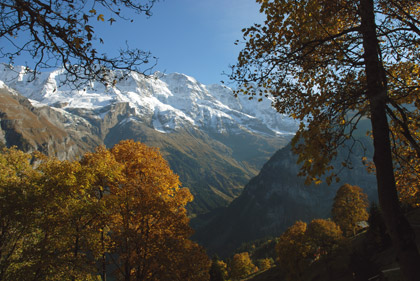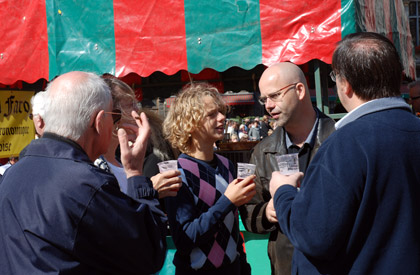When we first arrived in Europe I wrote I’d found gas cheaper that quality beer. Turns out that beer is less expensive in Germany than any other country we’ve been in (so far six beyond Germany) and German diesel gas is more expensive.
It gets more confusing when you hit Liechenstein and Switzerland, because you go from euros (worth more than the dollar) to Swiss francs (worth less). Suddenly it appears prices have gone up at least 50 percent. Usually more, because in Switzerland everything costs more. (They charge you two francs to use the toilet in the train station.)
With that in mind I will leave it to you convert these prices to dollars (worth more than when we arrived, making German beer cheaper still) seen in an upscale Swiss supermarket:
Chimay Grand Reserve 3.40 Swiss francs (all prices are for 33cl bottles) versus less than a euro in Belgium, Duvel 3.10, Leffe 2.70. La Fin du Monde (also seen in Paris) 3.20, Samuel Adams Boston Lager 2.80. A six-pack of Miller Genuine Draft 8.90 and a six-pack of Corona 15.50.
– I heard last week that the European Commission has rejected a request from the Halltertau hop growing region of Germany for an Appellation of Control (AOC). I know no details — and, sorry, won’t be tracking them down any time soon — like exactly what would be included in the designation. But, if you are inclined to do a little reporting yourself, the obvious question to ask is why did the EU accord Zatek Chmel a designation of origin and reject hops from the Halltertau region?
The EU has given 12 German brewing regions Protected Designation of Origin (PDO/Protected Geographical Indication (PGI). (Not news, just a bit of background.)
Back to Hallertau. Last week judges convened to evaluate this year’s crop, a reminder that the German hop industry focuses not only on where hops are grown but their quality. Panelists rate hops on aroma, appearance and other criteria, honoring the best of each variety.
I’m told that veteran judges may rub and sniff a few hops and tell immediately which yard they come from. It could be almost any kind, because each farm must grow multiple varieties (in order to stagger harvesting and get the most out of pretty dang expensive picking equipment). They’ll say something like “Oh, the soil in this guy’s farm is like this” (in German) and judging will slow while they discuss soil properties.
Sounds like terroir to me. How that is expressed in a beer? That’s up to the brewer.

